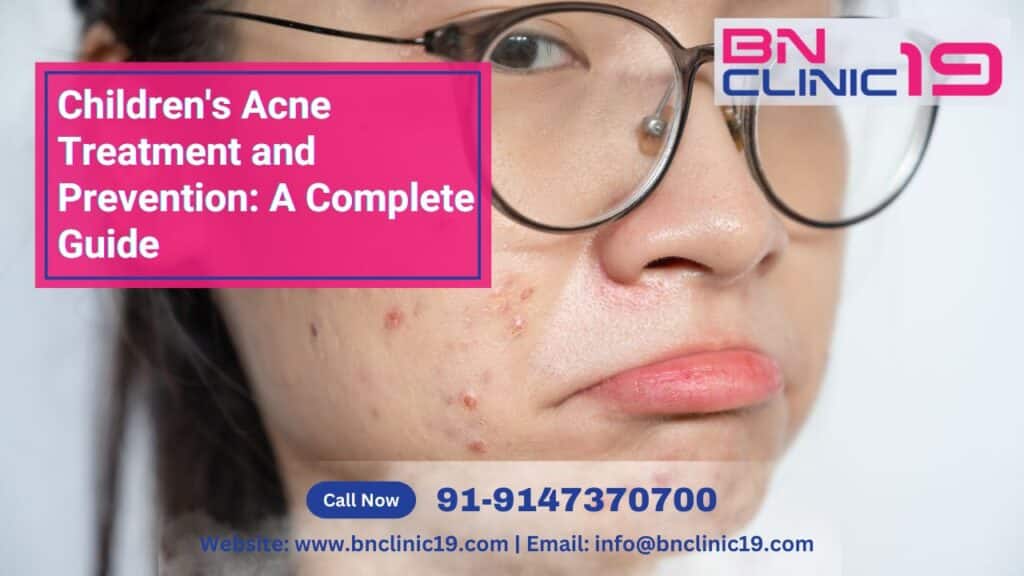Children’s Acne Treatment and Prevention: A Complete Guide
Teenage acne is a common skin condition that affects nearly 85% of adolescents, causing pimples, blackheads, whiteheads, and cysts on the face, back, and chest. It is primarily triggered by hormonal changes during puberty, which lead to excess oil (sebum) production, clogged pores, and bacterial growth. While acne is not a serious health concern, it can impact self-esteem and confidence. The good news is that effective treatment and prevention strategies can help teenagers manage acne and maintain healthy skin. In this guide, we’ll explore the best teenage acne treatment and prevention methods, along with expert recommendations from dermatologists. What Causes Teenage Acne? Teenage acne is caused by a combination of hormonal fluctuations, excess oil production, clogged pores, and bacterial growth. Here are the key triggers: ✔️ Hormonal Changes: During puberty, androgen hormones increase oil (sebum) production, leading to clogged pores. ✔️ Excess Sebum Production: Overactive oil glands cause greasy skin and increase the risk of breakouts. ✔️ Bacteria (P. acnes): This bacteria thrives in clogged pores and triggers inflammation. ✔️ Genetics: If parents had acne, teenagers are more likely to develop it. ✔️ Diet and Lifestyle: High-sugar, dairy-rich diets and stress can aggravate acne. ✔️ Wrong Skincare Products: Using harsh, pore-clogging products worsens acne. Understanding these causes helps in choosing the right treatments and preventing future breakouts. Teenage Acne Treatment Options 1. Gentle Skincare Routine Maintaining a consistent and gentle skincare routine is essential to prevent acne breakouts. ✔️ Use a Mild Cleanser: Wash your face twice a day with a gentle, oil-free cleanser to remove dirt and excess oil. ✔️ Avoid Harsh Scrubs: Exfoliating too much can irritate the skin and worsen acne. ✔️ Choose Non-Comedogenic Moisturizers: These are oil-free and won’t clog pores. ✔️ Use a Lightweight Sunscreen: Protect your skin from UV damage and acne scars by using a broad-spectrum SPF 30 sunscreen. 💡 Tip: Avoid touching your face frequently, as it transfers dirt and bacteria. 2. Topical Acne Treatments Over-the-counter topical treatments help in controlling breakouts and preventing new acne formation. ✔️ Benzoyl Peroxide: Kills acne-causing bacteria and reduces inflammation. ✔️ Salicylic Acid: Unclogs pores and removes dead skin cells. ✔️ Retinoids (Adapalene, Tretinoin): Help in skin renewal, preventing clogged pores and acne scars. 💡 Tip: Start with a lower concentration to avoid skin irritation. 3. Oral Medications (For Moderate to Severe Acne) If topical treatments don’t work, dermatologists may prescribe oral medications. ✔️ Antibiotics (Doxycycline, Minocycline): Reduce bacterial growth and inflammation. ✔️ Hormonal Therapy (For Girls): Birth control pills help balance hormone levels and reduce acne. ✔️ Isotretinoin (Accutane): Used for severe, cystic acne under strict medical supervision. 💡 Tip: Avoid self-medicating; always consult a dermatologist before taking oral medications. 4. Professional Dermatological Treatments For stubborn acne and acne scars, professional treatments provide fast and effective results. ✔️ Chemical Peels: Remove dead skin, unclog pores, and reduce acne scars. ✔️ Laser Therapy: Targets acne-causing bacteria and inflammation. ✔️ Light Therapy: Blue light therapy kills bacteria and reduces breakouts. 💡 Tip: These treatments should be done under a dermatologist’s supervision for the best results. How to Prevent Teenage Acne? ✔️ Wash your face twice daily with a mild, sulfate-free cleanser. ✔️ Keep hair clean and away from the face to prevent oil build-up. ✔️ Avoid touching or picking pimples to prevent scarring and bacterial spread. ✔️ Stay hydrated and eat a balanced diet rich in fruits, vegetables, and whole grains. ✔️ Manage stress through meditation, yoga, and exercise, as stress hormones can trigger acne. ✔️ Use sunscreen daily to protect against acne scars and pigmentation. 💡 Tip: Change pillowcases frequently to reduce dirt and oil build-up on the skin. Best Diet for Acne-Free Skin A healthy diet plays a significant role in acne prevention and treatment. ✔️ Eat: 🥗 Leafy greens (spinach, kale) – Rich in antioxidants. 🥜 Nuts and seeds (walnuts, flaxseeds) – Contain Omega-3 fatty acids. 🍇 Berries and citrus fruits – High in Vitamin C for healing skin. 🐟 Fatty fish (salmon, mackerel) – Anti-inflammatory properties. ✔️ Avoid: 🚫 Sugary foods & soft drinks – Increase insulin levels, leading to acne. 🚫 Dairy products – Can trigger hormonal fluctuations. 🚫 Fast food & processed snacks – Contain high amounts of unhealthy fats. 💡 Tip: Drinking 8-10 glasses of water daily flushes out toxins and keeps skin clear. When to See a Dermatologist? 📌 If acne is painful, persistent, or causing scars. 📌 If over-the-counter treatments don’t work after 6-8 weeks. 📌 If breakouts cause emotional distress or low self-confidence. 📌 If acne worsens despite following a proper skincare routine. 💡 A dermatologist can create a personalized acne treatment plan based on skin type and severity. Teenage acne treatment and prevention require a combination of good skincare, a healthy lifestyle, and, in some cases, medical intervention. While acne is common during adolescence, early treatment can prevent long-term scars and boost confidence. By following the right skincare routine, eating a balanced diet, and consulting a dermatologist when needed, teenagers can achieve clear and healthy skin. 💡 If you’re struggling with acne, visit a dermatologist in Kolkata for expert treatment and personalized skincare advice.
Children’s Acne Treatment and Prevention: A Complete Guide Read More »

